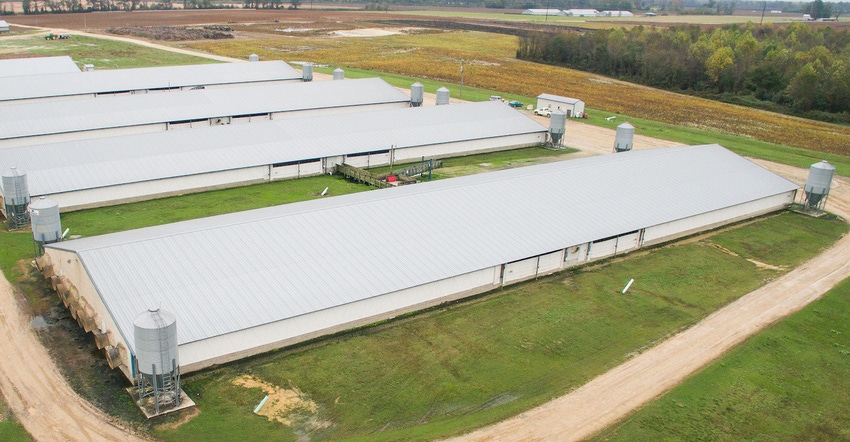Farmer’s neighbors testify there is no odor, but out-of-state lawyer helps sway jury.

A North Carolina jury has awarded more than $25 million to a Duplin County, N.C., couple who sued Smithfield Foods in an ongoing nuisance lawsuit. A Texas lawyer challenged the practices of the 4,700-hog farm owned by Joey Carter.
In the case, taking place in a federal courtroom in Raleigh, N.C., since May 29, the plaintiffs tried to paint Smithfield as unwilling to install new lagoon technology. It is part of an ongoing legal strategy that includes lawsuits by more than 500 residents against Murphy Brown/Smithfield Foods.
The plaintiffs “could not and did not claim any sickness, physical discomfort, injury or any health issues at all, despite so much of what you may have read,” explained Andy Curliss, chief executive officer of the North Carolina Pork Council (NCPC). “As they told it, there was so little of substance about the farm that it was years before they knew it was even there. What they did say is that sometimes they get odor, and sometimes they see flies and that they do not believe it’s from the horses, chickens or cows that are much closer to their home than the hog farm they moved in next to a quarter-mile away.”
Curliss added, “It is heartbreaking because the jury did not hear the full story about Joey Carter’s farm – and now an honest, hardworking farmer stands to lose everything. Joey Carter has always followed and exceeded the state’s laws, which are the strictest regulations of any state and on any sector of agriculture. He invested in modern technologies, and he responded promptly to any concerns raised by his neighbors, who said his farm is not a nuisance. He should not be punished.”
The testimony featured four people who lived closer to Carter than the plaintiffs, as well as the postal carrier.
Curliss said during testimony, J.C. Kenan, a neighbor who was also there before the farm, testified: “There is not an odor, and I live so close I can hear when the feeders run out in the hog house,” Kenan said.
Justin “Dub” Davis, who has lived with his family within eyesight for a decade and just built a new, second home nearby, also testified, saying, “We live next door. My wife and kids, we walk on the farm and near it. There’s no issue, no concern, no odor.”
The U.S. postal carrier, Kim Whaley, who drives around and past the farm almost every day, said, “I can’t tell you the last time I’ve ever smelled odor from the farm.”
NCPC and the National Pork Producers Council (NPPC) criticized the judge for preventing expert testimony on odors and for not allowing the jury to visit the farm.
“It is heartbreaking, because Joey Carter’s farm deserved a fair trial, and yet the jury was prevented from hearing the expert testimony of a renowned scientist who studied the area around the farm and determined it does not produce objectionable odor. The jury was prevented from visiting the farm in person – a request made by the defendant, Murphy Brown LLC. The jury was prevented from hearing about how these cases arose when out-of-state lawyers canvassed neighborhoods promising big payouts to plaintiffs who sued their neighbors,” NCPC said in a statement.
Jim Heimerl, NPPC president and a hog farmer from Johnstown, Ohio, added, “For the second time in as many months, a North Carolina verdict has come back in favor of plaintiffs after a jury was prevented from visiting the farm subjected to baseless claims. We are deeply troubled by this decision against a farm that has operated responsibly and in compliance with state laws since 1985 and that maintains the highest standards of environmental and community stewardship.”
NCPC encouraged Smithfield to appeal to the Fourth Circuit, which must review the decisions that directly shaped the outcome of the trial.
“This verdict signals that no farmer in North Carolina is safe from financially ruinous lawsuits, even if they comply fully with all laws and regulations, as Joey Carter did; even if they use best management practices, as Joey Carter did, and even if they had never received any complaints from their neighbors, as was the case with the Carter farm,” NCPC said.
Heimerl said in a statement, “We can’t allow trial lawyer abuse of our legal system to continue as it threatens the livelihood of livestock farming families, undermines the rural economy and unnecessarily increases food prices for consumers.”
“We expect this verdict will force Smithfield Foods to re-evaluate its operations in the state,” NCPC added. “We encourage state, county, local and agricultural leaders to show strong support for a company that has and continues to invest millions in modern technology and research in North Carolina and employs 10,000 people in rural counties."
NCPC said this case is exactly why farmers like Carter needed clarity and legal protection. The organization applauded actions of the bipartisan group of lawmakers who adopted changes during the week to provide certainty for agriculture in the 2018 farm bill.
About the Author(s)
You May Also Like




.png?width=300&auto=webp&quality=80&disable=upscale)
